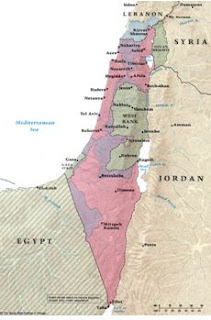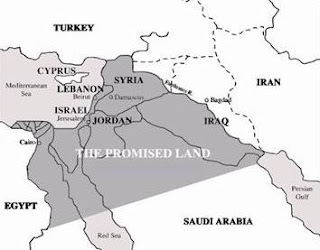All eyes are on the Middle-east the powder keg of the World. Yet, followers of Jesus know that our God is Sovereign in all things. In fact, as we have seen in this short series of blogs, He choose the Jews through whom His Son, Jesus Christ, would come into the world. It is these very people who today occupy, according to His promise, the little nation of Israel around which the modern conflict revolves.
There are three things the Bible predicts will happen in and around Israel before the return of the Lord Jesus with great power and glory to establish His thousand year reign on this earth. In the last blog we looked at the first part of this Trilogy.
- REBIRTH OF THE NATION
The Bible predicted that the Jews, having been dispersed would one day return to the land. This took place in 1946 when the United Nations carved out a piece of land for a Jewish nation.
- REPOSSESSION OF JERUSALEM
For the first time in 2,000 Jerusalem came under Israeli control during the 6 Day war inJune 1967. As a result of a phenomenal Israeli Blitz, Moshe Dayan, commander of the Israeli forces marched into Jerusalem and to the wailing wall, the last remnant of the Old Temple. There he proclaimed "We have returned to our holiest of Holy places, never to leave her again...No force on earth shall ever remove us from this place."
There remains one final part of Israel’s trilogy to be fulfilled.
- REBUILDING OF THE TEMPLE
Therefore when you see the 'abomination of desolation,' spoken of by Daniel the prophet, standing in thE holy place (Matt 24:15) He goes on to describe the tribulation period. The rebuilding of the temple signals that the tribulation period is about to begin.
The only place the temple can be built is on Mount Moriah in Jerusalem. Solomon’s temple was built there. Ezra’s temple which was destroyed by the Romans in 70 AD was built there.
The Temple of the End Times is to be built there.
However, there is one big problem with rebuilding the Temple on the temple mount. One of the most holy sites for Muslims, the Dome of The Rock, is built squarely on the temple sight. It is the second most holy sight of Islam.
The temple and the dome cannot occupy the same piece of real estate. Man if you think there is trouble in the Middle East now, you can just imagine what would happen if Israel were to try and remove the Dome of the Rock in order to rebuild the temple. But, somehow the Dome of the Rock must come down in order for the Temple to be rebuilt. That destruction could come as a result of an earthquake or it could be destroyed in a war. You can imagine the hostilities that will erupt when these two nations, the Jews and the Arab’s, from the Sons of Abraham clash over Mount Moriah.
When this final piece of Israel’s trilogy is in place, the time is exceedingly short. The bottom line is that we should not look for a lasting peace in the Middle-east. That does not mean we should not work towards peace. We should. However, we must realize that no matter how hard we try, there will be no lasting peace. The Middle-east will continue to be the Hot Spot of the world.
Power Keg Of The World
God has so arranged it, that Jerusalem is the powder keg of the world. The Bible says that the Final Battle will be fought over Jerusalem. Israel is in the land and the arabs want the land. This continual struggle and conflict has been brought about by the Rebirth of the Nation of Israel and will continue to bring the world to the brink of war.
So we see and will continue to see it unfolding on the nightly news in the cyber world. This is extremely important to watch because many Bible Scholars believe that the Bible predicts that there is going to come on the stage someone who will seemingly have a solution to the mid-east crisis and the Palestinian issue. Someone who will also bring peace to Israel for a season and this person is known as the Anti-Christ.
Are we to despair? Absolutely not. As scary as all this sounds, it actually sets up the culmination of God’s great plan to restore the rule His Kingdom on this earth. Nothing that our politicians can do will bring peace to the middle-east. As a matter of fact, when the entire world has been brought to the very brink as the armies of the world surround Jerusalem, King Jesus the true Prince of Peace will come in all His glory to establish the lasting peace the world has so long sought. That will be the focus of the next and final blog in this series.






